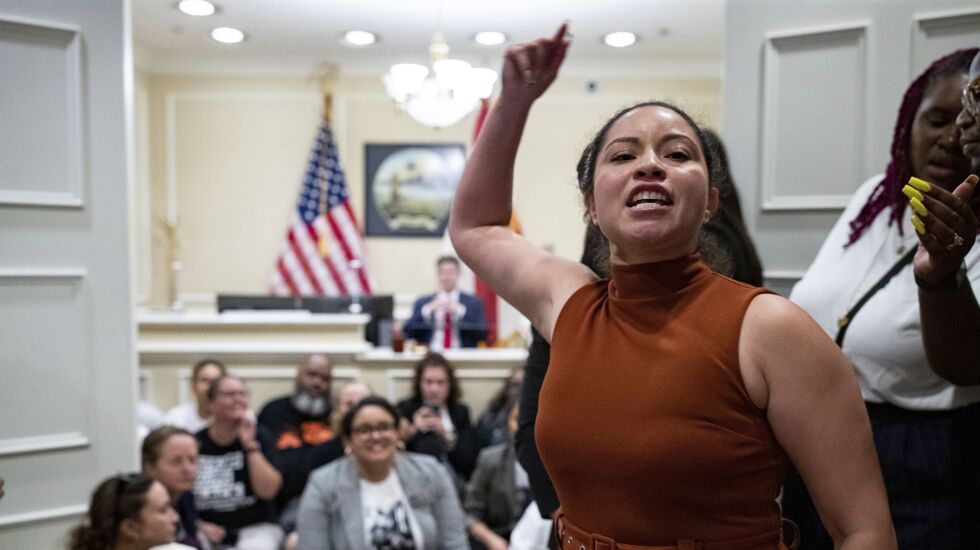
In the 20th century, white Americans threatened by the encroachment of racial equality erected Confederate monuments in their town squares.
In the 21st century, they restrict what students can read and learn about American history.
The Freedom to Learn campaign is fighting back.
“At last, there is a critical mass of people all over the country who are prepared to draw the line against conservative efforts to erase Black history, against efforts to make anti-racism unnameable, against efforts to undermine the ability of the next generation to understand what the meaning of that history is for the here and now,” Kimberlé Crenshaw, co-creator of the campaign, told Politico.
On the Freedom to Learn National Day of Action last week, activists in Florida staged a sit-in outside the office of Gov. Ron DeSantis, who signed a law last week that bans teaching about systemic racism and gender and race discrimination.
In Washington, D.C., and New York City, protestors marched outside the College Board headquarters to protest the watering-down of its Advanced Placement African American History course.
Across the country, concerned citizens convened teach-ins on college campuses and read-alouds of banned books.
And dozens of Urban League affiliate presidents, gathered in New Orleans for a Leadership Summit, stood together in solidarity with the thousands of Americans defending truthful, inclusive education and efforts to remedy systemic racial inequities.
‘Too dangerous to read’
Schools banned nearly 1,650 individual books in the last school year, most of them because they include themes about race or sexuality. Among the titles deemed to be too dangerous for children to read are Toni Morrison’s novel The Bluest Eye, which explores “the devastating effects of racism and self-hatred on young Black girls in America;” Ibram X. Kendi‘s Antiracist Baby, a guide for discussing racism with young children; and Roll of Thunder, Hear My Cry, which earned author Mildred D. Taylor the Newberry Medal, presented for “the most distinguished contributions to American literature for children”.
Access to truthful history, diverse books and critical ideas for students and educators are crucial to the nation’s history as a multicultural democracy. The so-called “War on Wokeness” threatens to eradicate decades of progress toward racial justice, by warping our view of the nation’s past, and thwart our future progress toward an equitable, multicultural society.
As highlighted in the National Urban League’s 2023 State of Black America® report, “Democracy in Peril: Confronting the Threat Within,” 21 states already have enacted measures that censor the honest examination of racism and race in American society, and the College Board has excised crucial material from its AP African American Studies curriculum in response.
The key to the true motivation behind these efforts lies in a little-discussed provision of one such bill: a ban on the suggestion that “meritocracy” and “a hard work ethic” were “created” as tools of oppression.
In effect, the provision would stifle any suggestion that racial gaps in wealth or income, educational attainment, home ownership, civic engagement or political representation are the result of anything other than merit and hard work.
Teaching history without distortion, denial
The true causes of these racial gaps — discriminatory hiring practices, persistent redlining, bias in home appraisals, inequitable school funding, voter suppression and gerrymandering— are evidence of systemic and institutional racism, which educators would not be permitted to acknowledge.
The Freedom to Learn campaign has demanded that the College Board:
- Restore the full AP African American Studies curriculum.
- Commit to making the course available online to students who live in states in which politicians have enacted bans of books, knowledge, and ideas contained in the original curriculum that would prevent the course from being taught in those states.
- Conduct an independent investigation into how the course development process was corrupted by outside political forces.
- Hold all implicated College Board officials accountable.
It is a betrayal of democratic values for any responsible leader to actively participate in distorting or denying any part of our country’s history.
As Loyola University professor of communication and African and African American Studies Karsonya “Kaye” Wise Whitehead noted, “It is not simply a debate about curriculum. We are standing up and saying that our classrooms — this nation’s heart and soul — are not up for debate; they are not up for discussion. You are not going to whitewash us out of history.”
Marc H. Morial is president and CEO of the National Urban League. He served as mayor of New Orleans from 1994 to 2002 and is a graduate of the University of Pennsylvania and the Georgetown University Law Center.







